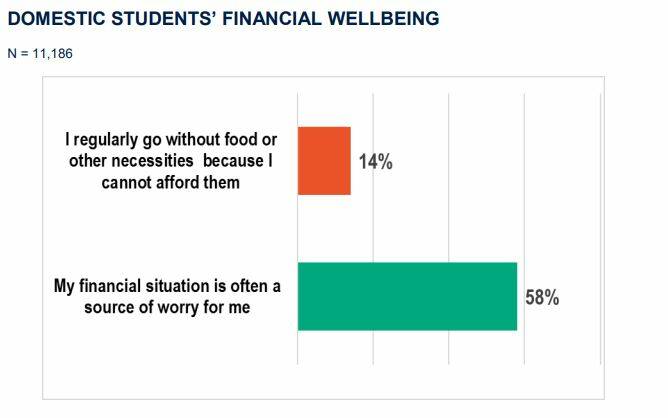
One in five university students from regional areas regularly go without food and other necessities because of financial hardship and defer university because of costs at a rate almost twice that of their metro-raised counterparts.
Subscribe now for unlimited access.
or signup to continue reading
The 2017 Universities Australia Student Finances Survey – released Monday – showed those from a rural background face more financial hardship when pursuing higher education and experience higher living costs.
National Union of Students President Mark Pace said the survey of more than 18,500 students revealed one in seven, or 15 per cent, were going without food and necessities because they could not afford them, a figure that jumps to 19 per cent for those who completed school outside urban centres.
“One in a million students choosing between food on the table and their education is too many, let alone one in seven,” Mr Pace said.
“There hasn’t been an increase to Newstart in real terms for 24 years. The single rate of Newstart is $278 per week, when we know essentials, such as rent and food cost $433.
“The Government must prioritise increasing income support to allow students access to higher education and the enormous opportunities it provides for millions of Australians.”

The survey found the majority of Australian students support themselves through work, 83 per cent.
Despite being more likely to receive government assistance and having a higher median income than their city counterparts, students from regional areas face significant shortfalls between their income and expenses.
Universities Australia chief executive Catriona Jackson said financial hardships were affecting students’ education, with 64 per cent of regional students saying their financial situation were a source of worry.
“For many, the amount of work they need to do to support themselves financially comes at a cost to their studies,” she said.
“Many students are trying to get rent and bills paid, and some are trying to keep food on the table for their own children, while juggling paid jobs and their studies.
“Our students should have the basic financial security and stability to perform at their best. Yet that’s simply not the case for many students from disadvantaged groups.”
Two in five students surveyed said their paid work adversely affects their university performance while 13 per cent of regional students had deferred their studies because they couldn’t afford it, compared to 7 per cent student from major cities.


